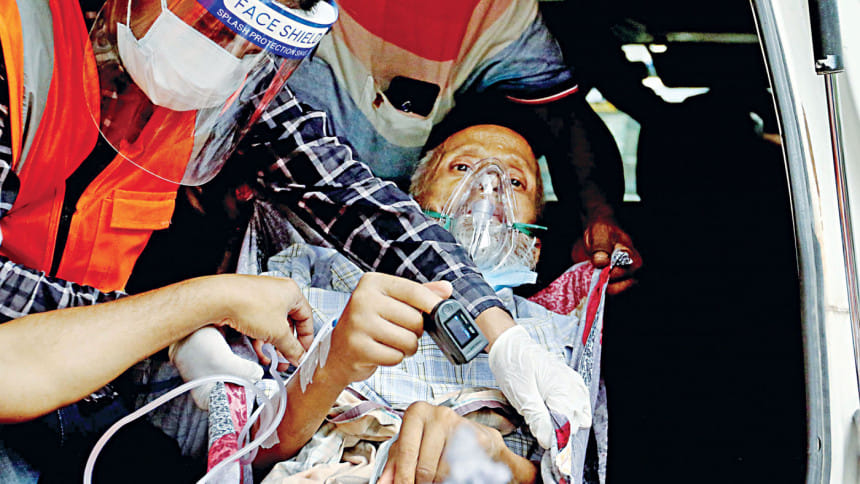Risking own lives to save lives


Muhammad Asaduzzaman, a doctor treating Covid-19 patients, has nightmares that people are gasping for air and pleading to be saved.
"When someone touches your hand, begs for help to breathe and when that person dies before you, it's very difficult to keep your calm. It's extremely hard to sleep at night peacefully. It comes back to haunt you," he says.
An assistant professor and head of the department of critical care at the capital's Kuwait Bangladesh Friendship Hospital, the 42-year-old doctor has been providing care to coronavirus patients for a year now. But over the last few weeks, the conditions of many critical patients have deteriorated fast, leaving physicians like Asaduzzaman absolutely hapless.
"I am tired of seeing people die. I could not do anything [in many cases] … I feel like I am on the verge of having a psychological breakdown," he told The Daily star.
Apart from claiming the lives of many doctors and health workers, the Covid-19 is also taking a heavy toll on their mental health.
According to Bangladesh Medical Association, 154 doctors have died and 2,911 others have been infected amid the pandemic. Besides, 23 nurses have lost their lives and 2,567 others contracted the virus, it said.
Although the health professionals have been resolute in the fight against the invisible enemy, they are now struggling due to exhaustion, anxiety, depression and sleep disorder owing to their long working hours and involvement in high-risk procedures while treating Covid patients, according to studies.
Suman Kundu is one such physician.
The doctor, who has been working at the ICU unit of the Dhaka Medical College Hospital since April last year, said he was living in constant fear.
"For the time-being, going through this horrible situation and surviving are the biggest challenges for me and my colleagues," he said.
After the first spell of the pandemic, Suman had a feeling that the storm might have been over as the infection and death rates subsided by the end of last year. But over the last few weeks, the situation turned dreadful.
"Now many patients' condition deteriorates quickly leaving us absolutely clueless," Suman said.
A recent study on the mental condition of doctors in the country paints a dismal picture.
The study, titled "Covid-19 Pandemic: Mental Health of Doctors in Bangladesh", shows that 78.5 percent physicians are experiencing stress, sadness, inadequate sleep/sleeping problems, poor concentration, low self-confidence and/or difficulty in doing daily activities.
The study, published in the Acta Scientific Neurology journal, said those issues can affect their personal and professional lives and also their relationships with others.
It assessed the mental health of 358 Dhaka-based doctors applying the "General Health Questionnaire-12" through an online survey.
"This psychological distress can turn into a mental disorder if it remains untreated," Roufun Naher, who teaches educational and counselling psychology at Dhaka University, told The Daily Star.
She also said in the study they found that female doctors were psychologically more distressed and vulnerable than their male counterparts.
Like the physicians, nurses are equally facing severe stress-related problems while treating Covid patients.
Kamrunnahar, a nursing officer at the Osmani Medical College and Hospital, said she never had Tachycardia (when the heart beats over 100 times a minute), but she is now taking medicines for it. She is also relying on pills for sleep.
Nahar said she has been taking antidepressants and sleeping pills for the last six months. "Still, I can't sleep at night."
Such cases were also evident in a study titled "Mental health symptoms among the nurses of Bangladesh during the Covid-19 pandemic", published in international journal Springer.
"Among the 547 nurses included in the study, the prevalence of mild to extremely severe depression, anxiety, and stress was 50.5 percent, 51.8 percent, and 41.7 percent respectively, and 61.9 percent of the respondents reported mild to severe psychological impact due to Covid-19," the study report said.
It also said that psychological symptoms were more prevalent among female nurses than the male ones.
The study, prepared on a web-based survey, collected data on the respondents between November 22 and December 6, 2020.
A total of 547 nurses participated in this study. The majority of the respondents were female.
This study revealed that 61.9 percent of the nurses suffered from some degree of mental distress during the pandemic.
Another significant finding of the study is that the nurses who faced any emotional abuse for being healthcare workers and working in the Covid-19 pandemic were associated with higher levels of depression, anxiety, stress, and psychological impact.
Sabbir Mahmud Tihan, one of the authors of the study and general secretary of Society for Nurses Safety and Rights, said, "Nurses are exhausted both physically and mentally. They need immediate support."
Tihan, also a nursing officer at the BSMMU, said the government should fulfil its promise of providing incentives to nurses.
Iqbal Arslan, president of Swadhinata Chikitsok Parishad or Swachip, said healthcare professionals involved in treating Covid-19 patients have been under tremendous physical and mental pressure for the last one year.
He suggested that those who have been serving the Covid patients for the last one year should be given rest.
"They should be replaced with those who are treating other general patients. Otherwise, the system may collapse anytime," he feared.

 For all latest news, follow The Daily Star's Google News channel.
For all latest news, follow The Daily Star's Google News channel. 



Comments